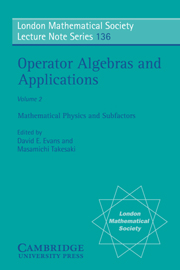Book contents
- Frontmatter
- Preface
- Contents
- UK-US Joint Seminar on Operator Algebras Lectures
- Some recent results for the planar Ising model
- The heat semigroup, derivations and Reynolds' identity
- C*-algebras in solid state physics: 2D electrons in uniform magnetic field
- Spin groups, infinite dimensional Clifford algebras and applications
- Subfactors and related topics
- Quantized groups, string algebras, and Galois theory for algebras
- On amenability in type II1 factors
- An index for semigroups of*-endomorphisms ofB(H)
- Coactions and Yang-Baxter equations for ergodic actions and subfactors
- Derived link invariants and subfactors
Spin groups, infinite dimensional Clifford algebras and applications
Published online by Cambridge University Press: 16 March 2010
- Frontmatter
- Preface
- Contents
- UK-US Joint Seminar on Operator Algebras Lectures
- Some recent results for the planar Ising model
- The heat semigroup, derivations and Reynolds' identity
- C*-algebras in solid state physics: 2D electrons in uniform magnetic field
- Spin groups, infinite dimensional Clifford algebras and applications
- Subfactors and related topics
- Quantized groups, string algebras, and Galois theory for algebras
- On amenability in type II1 factors
- An index for semigroups of*-endomorphisms ofB(H)
- Coactions and Yang-Baxter equations for ergodic actions and subfactors
- Derived link invariants and subfactors
Summary
THE INFINITE DIMENSIONAL COMPLEX ORTHOGONAL AND SPIN GROUPS
The overall reference for this material is a preprint (with title “The infinite complex spin groups”) by John Palmer and myself. Background on the general area is provided by the articles of Araki [1], Ruijsenaars [25,26] (note that Araki refers to the Clifford algebra as a ‘self-dual CAR algebra’) and Palmer [13] although I will try to make this exposition self-contained except for proofs. An interesting reference containing some of the results described here is [34] chapter 12 (which I first read after writing the draft for these notes).
The work discussed here is all inspired by the papers of the Kyoto School [31]. From a mathematical viewpoint the main difficulty with their work is the free use, for infinite dimensional spaces, of results whose proofs are only established in the finite dimensional case. In the latter the methods of proof are purely algebraic and may be found in the papers cited earlier in this paragraph. The generalisation of these finite dimensional results is of interest in its own right, independent of any desire to make rigorous the work of the Kyoto School. In fact it offers the prospect of going beyond their results within the purely infinite dimensional framework.
- Type
- Chapter
- Information
- Operator Algebras and Applications , pp. 77 - 102Publisher: Cambridge University PressPrint publication year: 1989



